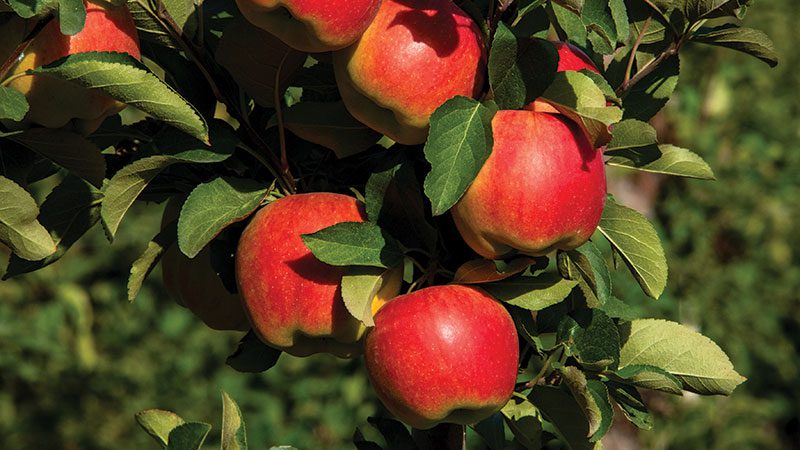News Bites
This article was originally published in June 2023

Top 10 apples
The Cosmic Crisp apple, developed and marketed for Washington growers, has cracked the Top 10 in sales value and volume in the United States. Citing Nielsen data from September 2022 to January 2023, the Cosmic was ranked 10th in volume and eighth in total sales value among apples sold in the United States, according to a news release from Washington State University. The other nine varieties on the Top 10 list were Gala, Honeycrisp, Granny Smith, Fuji, Red Delicious, Pink Lady, McIntosh, Envy and Ambrosia, the release said. (GoodFruit.com)
Strengthening sorghum
A gene discovered by a team of Agricultural Research Service (ARS) and Purdue University scientists could help fortify the defenses of sorghum to anthracnose, a disease of the cereal grain crop that can inflict yield losses of up to 50%. The discovery, to be reported in an upcoming issue of The Plant Journal, opens the door to breeding disease-resistant sorghum cultivars that are less reliant on fungicides to protect them, reducing growers’ production costs and safeguarding grain yields and quality, among other benefits. Sorghum is the fifth-most widely grown cereal grain crop worldwide, providing consumers not only with a source of food containing 12 essential nutrients, but also forage for livestock and material for bio-based energy. (ars.usda.gov)
Humanitarians of the Year
The James Beard Foundation announced that the 2023 Humanitarian of the Year Award honorees are the co-founders of the Black Farmer Fund: social entrepreneur and impact investor Olivia Watkins, and farmer and activist Karen Washington. The fund was founded after the two met at a conference in 2017 and shared frustrations about the lack of financial assistance available for Black farmers. They decided that there needed to be a means for community members to access capital that recognized the historical discrimination of lending and banking that informs the present reality of Black communities. (JamesBeard.org)
Raw milk laws
Oregon’s raw dairy proponents are going back to the drawing board after a proposal to allow more unpasteurized milk sales failed to gain traction this year. A recent legislative deadline has killed House Bill 2616, which would have expanded direct-to-consumer opportunities for raw milk and overturned retail restrictions specific to cows. Though the proposal isn’t moving forward, “raw milk is not going away” since farmers are looking for “safe, legal ways” to fulfill the “huge demand” from consumers, said Alice Morrison, co-director of the Friends of Family Farmers nonprofit, which supported the bill. (CapitalPress.com)
Insecticide regulations
Many insecticides used in agriculture or pest control in buildings are considered persistent and remain in the atmosphere, water and soil for years or even decades. But new research shows that in the Great Lakes region, at least three persistent insecticides are nearly eliminated, mostly as a result of regulatory action taken decades ago. Scientists say the results show the importance of swift action to ban the use of new persistent chemicals. (EHN.org)
Ocean protection deal
Nations have reached a historic agreement to protect the world’s oceans following 10 years of negotiations. The High Seas Treaty aims to help place 30% of the seas into protected areas by 2030, to safeguard and recuperate marine nature. The negotiations had been held up for years over disagreements on funding and fishing rights. (bbc.com)
Urgent climate targets
(A report) from the United Nations Intergovernmental Panel on Climate Change (IPCC) found that the world is likely to miss its most ambitious climate target—limiting warming to 1.5 degrees Celsius (2.7 degrees Fahrenheit) above preindustrial temperatures—within a decade. Beyond that threshold, scientists have found, climate disasters will become so extreme that people will not be able to adapt. The assessment synthesizes years of studies on the causes and consequences of rising temperatures, leading U.N. Secretary General António Guterres to demand that developed countries such as the United States eliminate carbon emissions by 2040—a decade earlier than the rest of the world. (WashingtonPost.com)
Organic produce sales
Organic fresh produce sales grew by 3% in 2022, while volume declined by 3.7%, as total sales topped $9.4 billion for the year, according to the 2022 Organic Produce Performance Report released recently by Organic Produce Network and Category Partners. The organic fresh berry category (which includes strawberries, blueberries, raspberries and blackberries) was the top organic produce category, holding more than 16% of organic fresh produce dollars in 2022. Overall fresh berry sales topped $1.6 billion for the year, with organic packaged salads a close second at $1.55 billion. (non-gmoreport.com)

Gruyere ruling
A U.S. appeals court has ruled that the word “gruyere” is a common label for cheese and cannot be reserved just for the kind made originally in France or Switzerland. The U.S. does not have the same strict rules as Europe on the designation of origin for foods, said judges in the Richmond, Virginia-based U.S. court of appeals for the fourth circuit. The U.S. Food and Drug Administration does set some standards for gruyere cheese, such as the existence in it of “small holes” or that such cheese is aged at least 90 days. (TheGuardian.com)
Collagen and deforestation
Tens of thousands of cattle raised on farms that are damaging tropical forests in Brazil are being used to produce collagen—the active ingredient in health supplements at the centre of a global wellness craze. The links between beef and soya and deforestation in Brazil are well known, but little attention has been given to the booming collagen industry, worth an estimated $4 billion. An investigation by the Guardian, Bureau of Investigative Journalism, Center for Climate Crime Analysis (CCCA), ITV and O Joio e O Trigo in Brazil has found cattle raised on farms causing deforestation were processed at abattoirs serving international collagen supply chains. (TheGuardian.com)
Flushing “forever chemicals”
What we flush down the toilet could be making us sick, according to a new study. Toilet paper could be a significant source of toxic “forever chemicals” in wastewater, according to research published in the journal Environmental Science & Technology Letters. The findings raise public health concerns since wastewater and its byproducts are frequently spread on agricultural fields to help grow crops. (TheNewLede.org)
Pebble Mine final blow?
A proposed mine project in Alaska may have been dealt its final blow. (In February), the Environmental Protection Agency (EPA) effectively vetoed the project, citing its potential harm to salmon fisheries in the state’s Bristol Bay watershed. The EPA issued a final determination banning the local disposal of dredged waste from building and operating the mine, which would have “unacceptable adverse effects” on local waters, including around 100 miles of streams and 2,000 acres of important breeding grounds for the bay’s salmon, per the agency. (Smithsonianmag.com)
Roundup lawsuit
Monsanto Company and its corporate parent Bayer are facing a federal lawsuit for civil rights violations after they allegedly excluded a farmworker from a Roundup cancer settlement because of her immigration status. According to the lawsuit, which was filed in the U.S. District Court for the Western District of Virginia, plaintiff Elvira Reyes-Hernandez is a migrant farmworker who worked on Virginia tree farms between 2015 and 2018, during which she sprayed the herbicide Roundup regularly. Reyes-Hernandez was diagnosed with non-Hodgkin lymphoma in 2019 and subsequently sued Monsanto, claiming that Roundup exposure had a role in causing her cancer. (ehn.org)
Tofurkey company sold
Plant-based food pioneer Tofurky and its sister brand Moocho have been acquired for an undisclosed amount by Morinaga Nutritional Foods, which is the U.S.-based manufacturer of Mori-Nu Silken Tofu. Morinaga has been a tofu supplier to Tofurky for 17 years. Tofurky, named after the signature round Thanksgiving roast that first appeared on tables in 1995, was a family-owned company that blazed several trails in the plant-based sector. (FoodDive.com)
Unsafe air pollution
Nearly the entire global population is regularly exposed to unsafe levels of air pollution, according to a recent study. Researchers at Monash University in Australia analyzed air pollution data from across the globe between 2000 and 2019 to estimate global daily exposure to PM 2.5, a type of air pollution made up of inhalable particles 2.5 micrometers or smaller. The team found that between 2000-2019, only 0.18% of the world’s land area and only 0.001% of the world’s population—about 78,000 people—had annual PM 2.5 exposure lower than the 2021 air pollution guidelines set by the World Health Organization (WHO). (TheNewLede.org)
Sugar substitute surge
The number of food products containing low- or no-calorie sugar substitutes has surged in the past five years, according to an analysis by Mintel, the market research firm. The food industry says sugar substitutes help people manage their weight and reduce intake of added sugars. But studies suggest that fake sugars can also have unexpected effects on your gut and metabolic health and even promote food cravings and insulin resistance, a precursor to Type 2 diabetes. (WashingtonPost.com)
